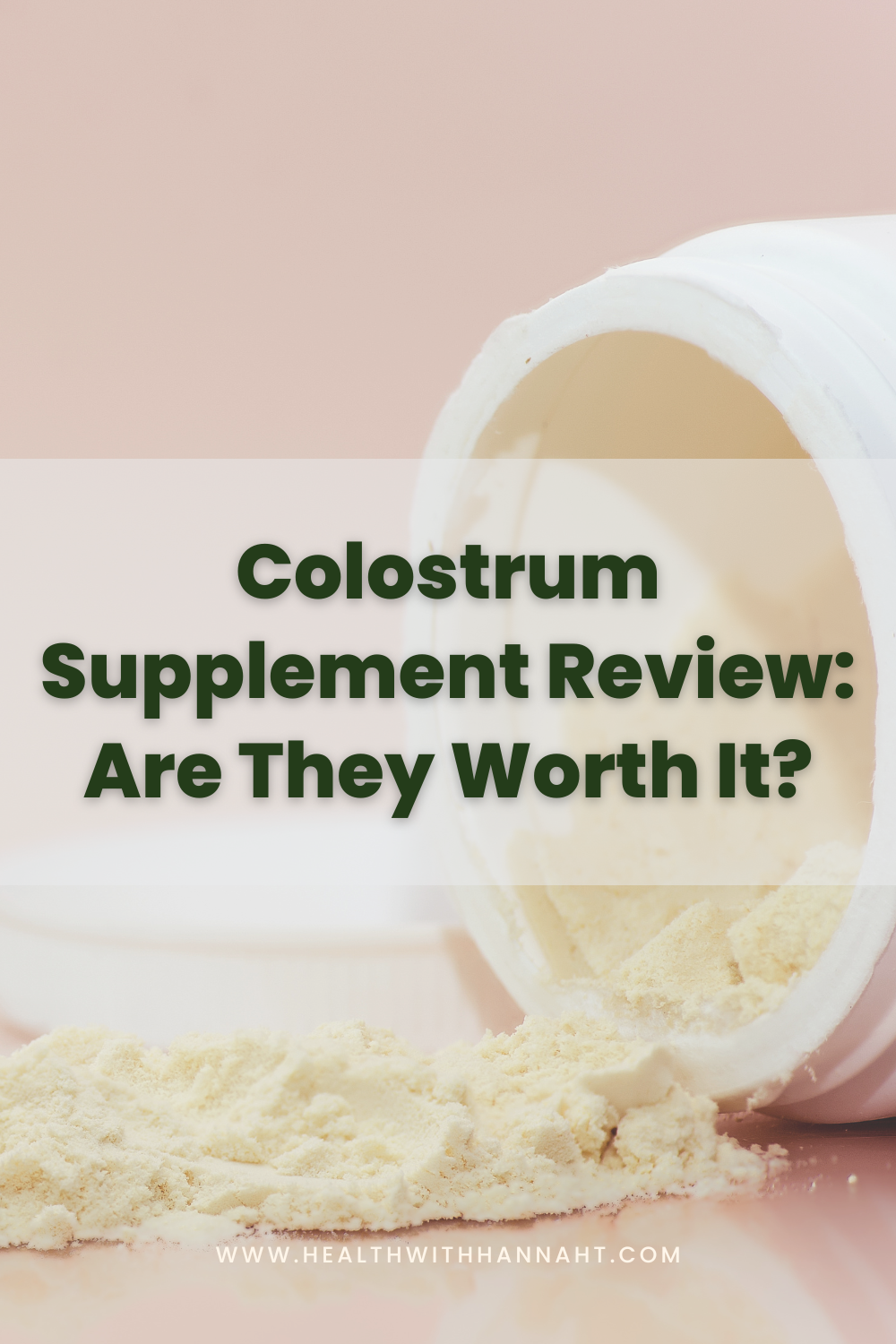Colostrum Supplement Review: Are They Worth It?
Ahh wellness culture. One day they are telling us that diary is bad for us, and the next they are selling us cow colostrum.
Bovine colostrum supplements have increased in popularity and are claimed to help boost immunity, heal your gut, and even increase energy levels. But is there any truth to these claims? Should you add a colostrum supplement to your routine?
If you’re new here, hello and welcome! My name is Hannah and I am a non-diet dietitian here to help you improve your relationship with your food and finally find food freedom. As a non-diet dietitian, I frequently get asked about taking supplements such as colostrum.
In this blog we will cover
What is colostrum?
What are colostrum supplements?
What are colostrum supplements used for?
The issues with colostrum supplements
The irony of wellness culture
Alternatives to colostrum supplements
What is colostrum?
Colostrum is the first form of milk that is released by the mammary glands after giving birth. You may have heard it referred to as “liquid gold”, as it is can be yellow in color and has many benefits for a newborn baby, including antibodies and vitamins and minerals.
Humans are not the only mammals that produce colostrum. Many other species produce this “first milk” after delivery of a newborn. And it has recently become trendy to use cow colostrum for human consumption and alleged improvements in wellness.
What are colostrum supplements?
Bovine (cow) colostrum supplements are available in both pills and powders to be taken as supplements. Because there is a limited window when humans can receive their mother’s colostrum, colostrum supplements have been formulated to replicate the nutrient-dense profile for adults.
Popular colostrum supplement brands include:
ARMRA Colostrum Premier Powder
WonderCow Colostrum Powder Supplement
Miracle Moo Grass Fed Bovine Colostrum
What are colostrum supplements used for?
Colostrum supplements are claimed to have many benefits, including:
Immune health
Gut health
Reduced inflammation
Muscle recovery and enhanced athletic performance
Skin health
Sepsis, respiratory infections, and more
Apparently there is nothing this supplement can’t do. Let’s break down the most popular claims and see if they hold up.
Colostrum supplements and immune health
Colostrum is known to benefit an infant’s immune system at birth, but jury is still out on if it is effective in adults. It appears that more evidence with remarkable results is needed before we can turn to colostrum as an “immunity booster”.
For example, this 2020 systematic review and meta-analysis showed that colostrum supplementation on athletes and physically active individuals resulted in little to no improvements on immunity health markers.
Colostrum is rich in a substance known as lactoferrin, which is being studied for its anti-inflammatory and anti-cancer properties.
My biggest hold up is that bovine colostrum is meant to build immunity in cows, not humans. And colostrum as a whole is intended for infants, not adults who have built up their immune systems and have developed digestive tracts that may not even absorb the compounds in colostrum.
Colostrum supplements and gut health
The use of colostrum for gut health is also pretty wishy washy.
This 2017 study shows decreases in intestinal permeability (“leaky gut”) in athletes. Maybe kinda sorta promising? Hard to make any conclusions on one study done on a sample size of only 16 men.
This 2022 review ultimately found that more research is needed.
Once again, further evidence is needed to make any universal recommendations. As a registered dietitian, there are many suggestions that I would make to improve gut health before encourage a colostrum supplement.
Colostrum supplements and athletic performance
Many of the bovine colostrum supplements claim to help with athletic performance, whether it be in the form of improvements in body composition, optimized performance, or increases in energy.
This 2021 review shows unconvincing evidence of colostrum benefiting body composition and physical performance. This article also was funded by a colostrum supplement company.
My take - adequate nutrition, hydration, and with proper rest and recovery are more likely to help with athletic performance than a colostrum supplement.
The issues with colostrum supplements
We are humans, not cows
As previously mentioned, cow colostrum contains specific antibodies and nutrients that are beneficial to cows, but this may not translate to human benefit.
We are adults, not newborn babies
In adults, the nutrients that we consume are first broken down in the intestines before they can be absorbed into the bloodstream. In newborns, however, the nutrients from colostrum can pass freely into the bloodstream because their intestines are still underdeveloped. This means that as adults, these compounds are likely not as beneficial to us as they are newborn babies.
Limited evidence supporting its use
@dietitianhannah Only in wellness culture can influencers demonize dairy and processed foods while in the same breath promote colostrum supplements 🥴 #colostrum #colostrumpowderreview #miraclemoo #wondercow #wondercowcolostrum #dietitian #dietitiansoftiktok #dietitiantips #nutritiontips #dietitianhannah #colostrumpowder ♬ original sound - Dietitian Hannah
While we do have some research on the use of colostrum supplements, the evidence is sparse. Even more so if looking for high-quality human studies.
There is much to be considered before making a universal recommendation for colostrum supplements, including optimal dosage, long term effects, and populations that should steer clear of these powders and capsules.
Quality and safety concerns
Like all dietary supplements, colostrum powders and capsules are not regulated by the FDA. This means that we cannot be for sure that what is on the supplement facts label matches what is actually in the product.
If you do insist on taking a colostrum supplement (or any supplement, for that matter), it is important to only purchase from reputable companies that follow good manufacturing practices and undergo third-party product testing.
Possible side effects
Taking bovine colostrum supplements may lead to side effects such as:
Nausea
Flatulence
Diarrhea
Unpleasant taste
Individuals with dairy allergies or lactose intolerance should also avoid bovine colostrum supplements.
High price tag
Another turn off of bovine colostrum supplements is the expense. ARMRA, one of the more popular brands, costs $49.99 for 30 servings or $119.99 for 90 servings. Cha-ching!
Wellness culture is notorious for recommending products that the average person cannot afford and then shaming them for not “making their health a priority”.
Questionable ethical practices
A large concern that many have expressed, namely on social media, is the sourcing of bovine colostrum. When extracting the colostrum from the mother cow, does this mean that we are effectively depriving this “liquid gold” from the baby calf?
Some of the colostrum supplement brands claim to be “sustainable”, “grass-fed”, and use “calf-first sourcing”. Even with these claims being made, I find it difficult to know for sure if the calves are getting what they need. Who is verifying if these claims are true? Any of these claims can be slapped on the supplement packaging without having to actually meet any standards.
All that said, if animal ethics and sustainability are important to you, it may be important to consider this before purchasing a bovine colostrum supplement.
The irony of wellness culture
The biggest beef (pun intended) that I have with cow colostrum supplements is the irony of who is promoting them the most. Many of the people that I have seen advertising colostrum capsules or powders are the same influencers that claim that dairy is inflammatory, raw milk is superior, and that we should only consume foods with “clean" and “unprocessed” ingredients.
Do you see what I’m getting at?
It is always your choice to consume whatever you wish to consume. Unless I am your dietitian, I could care less if you decide to add colostrum supplements to your daily routine. What I do have a problem with is influencers who promote these supplements (usually without following FTC disclosure guidelines, by the way) to a large, unknowing audience while simultaneously bashing other foods and ingredients that are safe to consume and may even be health-promoting (including dairy products such as milk and yogurt).
@dietitianhannah Replying to @despiteeverythingitsyou eating enough can solve so many problems 🙌🏻 #ibs #guthealth #wellness #wellnessculture #dietculture #dietitiansoftiktok #dietitianhannah #foodfreedom #ditchthediet #colostrum #bonebroth ♬ original sound - Dietitian Hannah
“Don’t eat ‘processed’ foods, but do take this ultra-processed supplement that is not third-party verified. Don’t drink milk, but do use this “superfood powder” that also comes from a cow’s udders.” I can’t even make this stuff up.
Alternatives to colostrum supplements
Like I mentioned, it is ultimately your choice if you decide to take a colostrum supplement. But for those of you who do not wish to spend your money on expensive powdered milk, there are many alternate ways that you can support your gut health, immune system, and metabolism.
Eat a varied diet with adequate fiber and fluids.
Eat enough. Your gut, immune system, and metabolism will all suffer if you are chronically underfed.
Manage stress.
Get plenty of sleep.
Establish a joyful exercise routine.
Block content creators who push supplements as a one-size-fits-all solution.
Bottom line - should you be taking a colostrum supplement?
Colostrum is very beneficial for babies, but we do not have the evidence to suggest the supplementation of bovine colostrum in humans.
Bovine colostrum supplements are wildly expensive and most frequently recommended by unqualified influencers with little to no understanding of what they are promoting. Just because that gut health girlie swears by colostrum for all of her tummy troubles, this does not mean that the benefits will translate to you.
What are your thoughts on the colostrum supplement trend? Leave a comment below!
Learn more
Featured podcast episodes
You might like these diet review videos
Want more help on your diet ditching journey?
Join my signature membership to become part of a community of ex-dieters working towards food freedom and making peace with food so they no longer need to cut out their favorite foods.































































